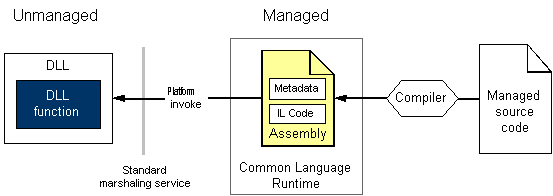Consuming Unmanaged DLL Functions
Platform invoke is a service that enables managed code to call unmanaged functions implemented in dynamic link libraries (DLLs), such as those in the Windows API. It locates and invokes an exported function and marshals its arguments (integers, strings, arrays, structures, and so on) across the interoperation boundary as needed.
This section introduces tasks associated with consuming unmanaged DLL functions and provides more information about platform invoke. In addition to the following tasks, there are general considerations and a link providing additional information and examples.
To consume exported DLL functions
-
Minimally, you must specify the name of the function and name of the DLL that contains it.
Create a class to hold DLL functions.
You can use an existing class, create an individual class for each unmanaged function, or create one class that contains a set of related unmanaged functions.
Create prototypes in managed code.
[Visual Basic] Use the Declare statement with the Function and Lib keywords. In some rare cases, you can use the DllImportAttribute with the Shared Function keywords. These cases are explained later in this section.
[C#] Use the DllImportAttribute to identify the DLL and function. Mark the method with the static and extern modifiers.
[C++] Use the DllImportAttribute to identify the DLL and function. Mark the wrapper method or function with extern "C".
-
Call the method on your managed class as you would any other managed method. Passing structures and implementing callback functions are special cases.
For examples that demonstrate how to construct .NET-based declarations to be used with platform invoke, see Marshalling Data with Platform Invoke.
A closer look at platform invoke
Platform invoke relies on metadata to locate exported functions and marshal their arguments at run time. The following illustration shows this process.

When platform invoke calls an unmanaged function, it performs the following sequence of actions:
Locates the DLL containing the function.
Loads the DLL into memory.
Locates the address of the function in memory and pushes its arguments onto the stack, marshalling data as required.
Note
Locating and loading the DLL, and locating the address of the function in memory occur only on the first call to the function.
Transfers control to the unmanaged function.
Platform invoke throws exceptions generated by the unmanaged function to the managed caller.
